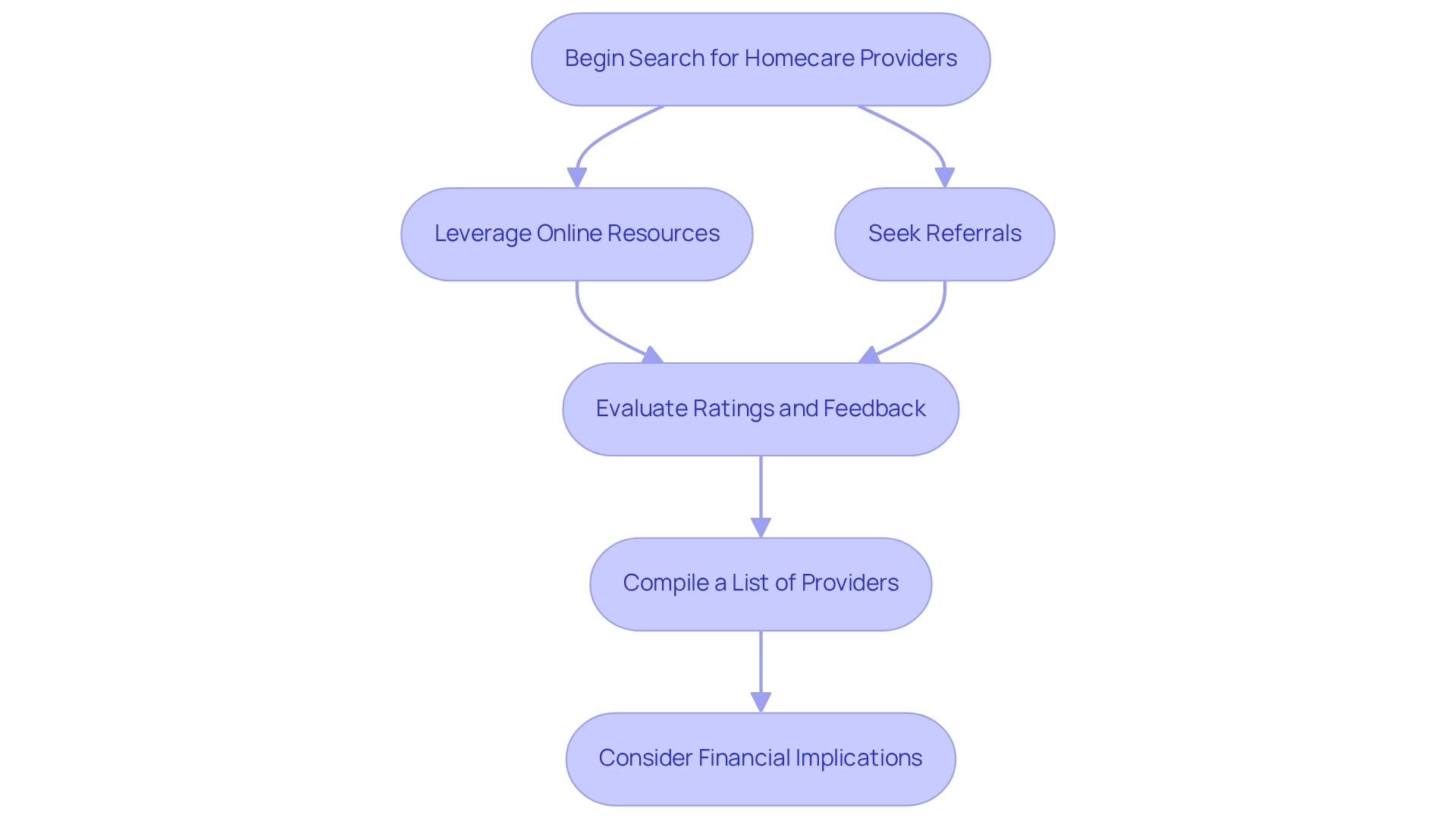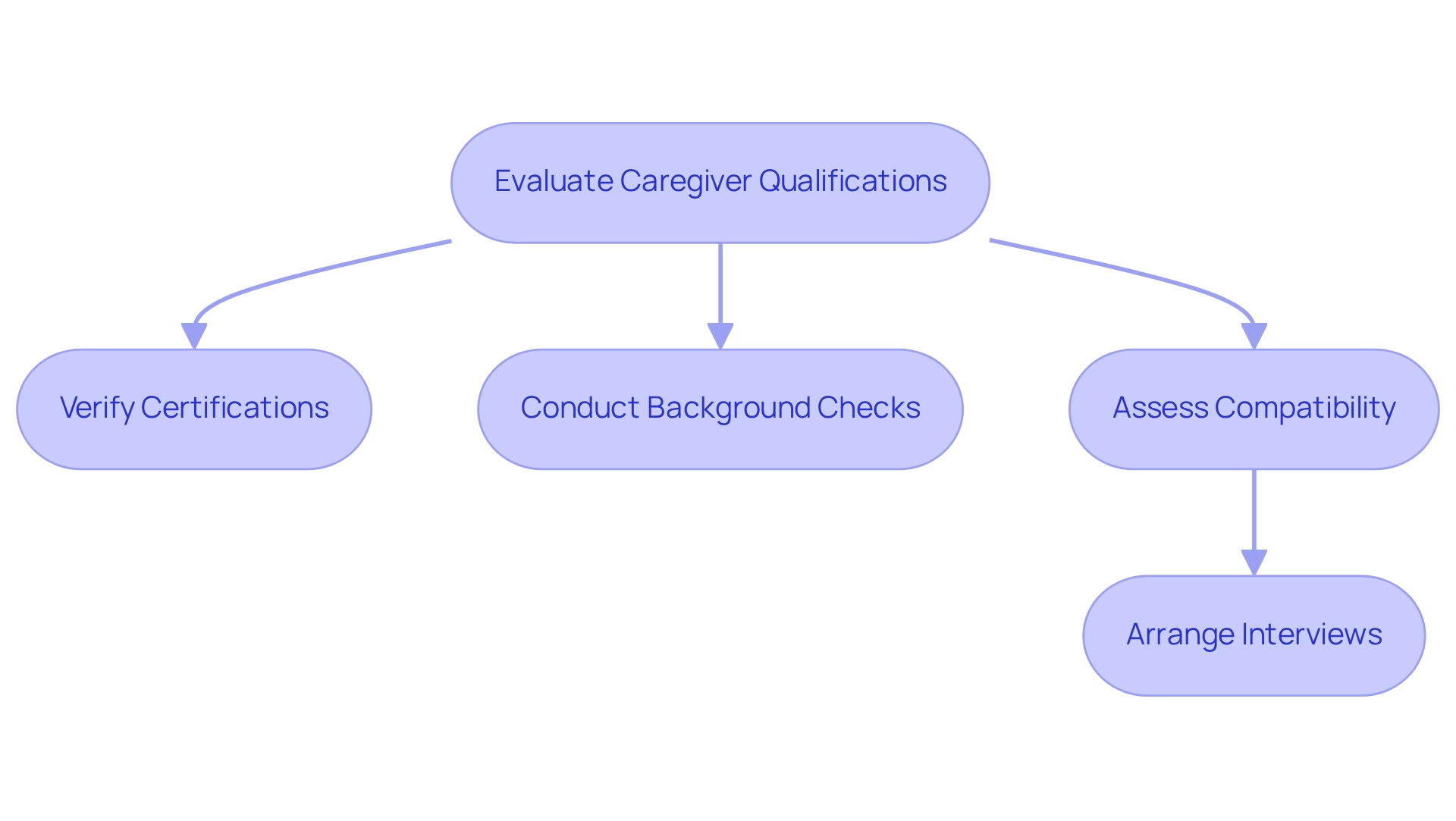Overview
Finding the right elderly homecare services nearby can feel overwhelming, but you are not alone in this journey. Start by assessing the care needs of your loved one, considering both their physical and mental health. Research local providers who can meet those needs, and take the time to evaluate caregiver qualifications to ensure compatibility. Understanding the costs involved is also crucial, as it allows families to plan effectively for their loved ones’ care.
In addition to these steps, think about what matters most to your family. Caregiver compatibility is vital; after all, the relationship between your loved one and their caregiver can significantly impact their well-being. Financial planning is another essential aspect, helping you navigate the various options available while ensuring that your loved one receives the best possible care.
As you embark on this important decision, remember that we’re here for you. Your comfort and peace of mind are our priority, and we encourage you to reach out for support. By taking these steps, you can make informed decisions that reflect your loved one’s needs and preferences. Together, we can ensure that they receive the compassionate care they deserve.
Introduction
Navigating the complexities of elder care can be a daunting task for families. It’s natural to feel overwhelmed when trying to ensure that a loved one receives the right support at home. As many families prefer aging in place, understanding how to assess care needs, research local providers, and evaluate caregiver qualifications becomes essential.
In this article, we will explore the critical steps involved in finding the best homecare solutions. We will highlight the importance of a thorough assessment of physical, mental, and social needs, ensuring that every aspect of care is considered. Additionally, we will address the financial aspects of care, empowering families to make informed decisions that prioritize both quality and affordability.
As the landscape of home healthcare continues to evolve, being equipped with the right knowledge can truly make a difference. Together, we can enhance the quality of life for seniors, ensuring they receive the compassionate care they deserve. Remember, you are not alone in this journey; we’re here for you.
Assess Your Loved One’s Care Needs
Begin by thoroughly evaluating your loved one’s daily activities and health status. It’s essential to consider the following key areas:
- Physical Health: Assess mobility issues, chronic conditions, and any recent changes in health. Notably, over half of assisted living residents require assistance with walking and bathing, highlighting the importance of mobility assessments. Indicators suggesting the need for elderly homecare near me include difficulty with personal hygiene, dressing, cooking, cleaning, or managing medications.
- Mental Health: Look for signs of cognitive decline, depression, or anxiety, as these can significantly impact overall well-being. Families should be aware that health issues such as managing chronic conditions or frequent hospitalizations may require continuous support.
- Daily Living Activities: Determine if assistance is needed with essential tasks such as bathing, dressing, eating, or medication management. Long-term assistance through elderly homecare near me often involves support for these daily activities, which are crucial for maintaining independence. As Mary McDonald Winners, a gerontologist, observes, “Long-term assistance is support for an individual that helps with grooming, bathing, dressing, eating, and other tasks throughout the day.”
- Social Needs: Evaluate the necessity for companionship or social interaction to prevent feelings of isolation, which can adversely affect mental health. With 77% of individuals over 50 expressing a strong preference to age in place, understanding these social needs is vital.
Utilize checklists or assessment tools from reputable resources, such as the National Institute on Aging, to guide your evaluation process. Document your findings meticulously to facilitate clear communication of needs to potential caregivers. This organized method not only helps in determining the appropriate level of assistance but also ensures that your family member receives the individualized support they need with elderly homecare near me.
Additionally, consider the holistic approach to aging at home, as discussed in the case study “Mastering the Art of Aging at Home: A Holistic Approach,” which emphasizes the integration of physical, emotional, and social support systems to enhance the quality of life for seniors.
Research Local Homecare Providers
Begin your search for elderly homecare near me by leveraging online resources and local directories to ensure you find the best options available. These agencies are well-versed in the available services and can guide you toward reputable providers, especially those offering elderly homecare near me. Pay attention to ratings and feedback from other families to make informed decisions.
- Referrals: Don’t hesitate to ask healthcare professionals, friends, or family for their recommendations. Personal experiences can offer insights into the dependability and quality of elderly homecare near me provided by specific providers. As you create a list of potential homecare providers, remember to note their services, availability, and contact information. This will aid in your assessment and assist you in making the best decision for your loved one’s support requirements, including options for elderly homecare near me. In 2025, the average ratings of homecare agencies in Miami reflect a growing trend towards quality service, making thorough research even more critical. Furthermore, with the increase in home healthcare services since the COVID-19 pandemic, including a 154% rise in telehealth visits, the variety of available options has grown considerably, offering more selections than ever before.
It’s also crucial to consider the financial implications of treatment decisions, as the cost-effective and compassionate solutions from Best Care Nurses Registry can ease the burden on families. The expense of support for an individual with Alzheimer’s disease is three times greater than for a person without dementia. Moreover, around 40% of home support workers are individuals of color, emphasizing the variety in home assistance services that may appeal to families looking for culturally proficient support.
The advantages of personalized home health services extend beyond mere physical assistance; they also address emotional support and safety, enhancing the overall quality of life and independence for seniors. Remember, your comfort is our priority, and we’re here for you every step of the way.

Evaluate Caregiver Qualifications and Compatibility
When assessing attendants for elderly homecare near me, it’s essential to consider several important aspects to ensure the best match for your family member, including confirming that attendants possess the required certifications, training, and experience in elderly support. Specialized training in areas relevant to your loved one’s specific needs is especially valuable. Statistics indicate that individuals with formal training are better equipped to manage complex health issues, thereby enhancing the quality of care provided. CNAs and HHAs play a crucial role in this process, assisting with daily activities and maintaining consistent communication with family members regarding the patient’s condition.
- Background Checks: Verify that the agency conducts thorough background checks on their staff. This step is vital for ensuring the safety and security of your loved one. Agencies like Best Care Nurses Registry emphasize comprehensive vetting procedures, significantly reducing the likelihood of hiring inappropriate attendants.
- Compatibility: Arrange interviews or meet-and-greet sessions to assess the attendant’s personality and approach. Observing how the provider interacts with your family member can offer insights into their compatibility. Research shows that a good match can lead to improved emotional well-being for seniors, making this step essential. Best Care Nurses Registry offers a tailored approach for elderly homecare near me, enabling you to select compassionate professionals who align with your loved one’s needs. Feedback from others can provide valuable perspectives on the provider’s performance and the standard of care delivered. Additionally, consider the financial implications of caregiving; providers incur an extra $13.4 billion annually in healthcare expenses for employers, underscoring the importance of selecting qualified personnel. Moreover, primary family supporters of individuals with dementia dedicate an average of 9 hours daily to offering assistance, highlighting the significant time commitment involved in providing care. Understanding these factors can help you make a more informed choice.
To involve guardians, follow these three straightforward steps:
- Call to speak with our friendly staff to discuss your needs.
- We’ll discuss your situation with you or your family member and seek a care plan from your doctor that perfectly caters to your needs.
- We will refer compassionate individuals whom you select to collaborate with.
Call (888) 203-2529 to schedule a call and discuss your needs. Taking these steps is essential to ensure that your loved one feels comfortable and secure with their caregiver, ultimately enhancing their quality of life.

Understand Costs and Payment Options
Understanding the costs associated with elderly homecare near me is crucial for effective planning.
- Research Average Costs: Start by exploring the average hourly rates for homecare services in South Florida, projected to be around $150 per hour in 2025. Monthly expenses can reach approximately $4,551, highlighting the growing demand for elderly homecare near me as more seniors opt to age in their own homes.
- Payment Options: It’s essential to discuss various payment methods with potential providers. Generally, options include private payment, long-term support insurance, and Medicaid. At Best Care Nurses Registry, we are here to help by accepting most long-term support insurances directly on your behalf. This allows you to direct the carrier to pay us directly through an Assignment of Benefits (AOB). While Medicare does not cover activities of daily living provided by private duty caregivers, it may offer limited assistance for specific services. Understanding these avenues can significantly impact your financial planning.
Consider exploring local and state programs that may offer financial assistance for elderly homecare near me. Resources like the National Institute on Aging can guide you through available options, ensuring you are aware of all potential support. Additionally, organizations such as the Area Agency on Aging can provide valuable information on local assistance programs.
- Budgeting: Developing a thorough budget that considers various levels of support is vital. Reflect on the median costs of alternatives, such as nursing homes at $290 per day and assisted living facilities at around $4,300 per month, to evaluate your options. Factor in any financial assistance you may qualify for to ensure a realistic financial plan.
As Sandy Baker notes, “But this isn’t expected — demand will probably keep growing at a rate faster than available professionals.” This thorough understanding of costs and payment options will empower you to make informed decisions for your loved one’s care. For personalized assistance, we invite you to call Best Care Nurses Registry at (888) 203-2529 to discuss your needs. Your comfort is our priority.
Conclusion
Navigating the intricacies of elder care can be a challenging journey for families, but understanding the essential steps can significantly ease this process. Assessing a loved one’s care needs is the first critical step, encompassing evaluations of physical health, mental well-being, daily living activities, and social requirements. This holistic approach ensures that every aspect of a senior’s life is considered, ultimately leading to tailored care solutions that enhance their quality of life.
In addition, researching local homecare providers empowers families to make informed choices. Utilizing resources such as the Eldercare Locator and seeking referrals from trusted sources can uncover a wealth of options. Evaluating caregiver qualifications and compatibility is equally vital; ensuring that caregivers have the necessary training and a good rapport with your loved one can lead to improved emotional well-being and overall satisfaction with care.
Furthermore, understanding the financial implications of homecare services is essential for effective planning. With the rising costs associated with in-home care, exploring payment options and potential financial assistance can alleviate some of the burdens families face. By taking these informed steps, families can ensure that their loved ones receive compassionate, high-quality care while promoting independence and dignity in their later years.
In summary, the journey of finding homecare solutions is complex but manageable with the right knowledge and resources. Families are not alone in this endeavor; numerous tools and support systems exist to guide them through every step of the process. Prioritizing care needs, compatibility, and financial planning will ultimately lead to a more positive experience for both seniors and their families, fostering a nurturing environment for aging in place.
Frequently Asked Questions
What should I evaluate when assessing a loved one’s need for elderly homecare?
Begin by evaluating their physical health, mental health, daily living activities, and social needs. This assessment will help determine the level of assistance required.
What aspects of physical health should I consider?
Assess mobility issues, chronic conditions, and any recent changes in health. Indicators for needing homecare include difficulties with personal hygiene, dressing, cooking, cleaning, or managing medications.
How can I identify mental health issues in my loved one?
Look for signs of cognitive decline, depression, or anxiety. Be aware that managing chronic conditions or frequent hospitalizations may indicate a need for continuous support.
What daily living activities should I evaluate?
Determine if assistance is needed with essential tasks such as bathing, dressing, eating, or medication management. Support for these activities is crucial for maintaining independence.
Why are social needs important in this assessment?
Evaluating social needs helps prevent feelings of isolation, which can negatively impact mental health. Many individuals over 50 prefer to age in place, making social interaction vital.
Are there tools available to assist with this evaluation process?
Yes, checklists or assessment tools from reputable resources like the National Institute on Aging can guide your evaluation process. Document your findings to communicate clearly with potential caregivers.
What is the holistic approach to aging at home?
The holistic approach emphasizes integrating physical, emotional, and social support systems to enhance the quality of life for seniors. This approach is discussed in the case study “Mastering the Art of Aging at Home: A Holistic Approach.”











